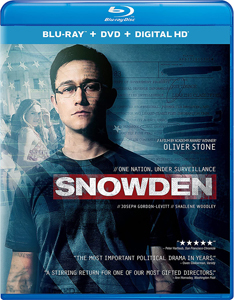Whether Trump or Clinton wins the election tonight, the NSA’s spying program will continue, so it seems like a good time to watch “Snowden,” the most hyped-up liberty-themed film of the year. Oliver Stone’s chronicle of the CIA agent who revealed that our government is spying on us is unquestionably an important document, but it doesn’t offer many surprises for people who followed this story in even cursory fashion as it played out in the news.
If this were a fiction piece, I’d criticize “Snowden” – and its main character — for being both too superheroic and too one-dimensional. But as a docu-drama of a man who has been thoroughly documented in recent years, it’s hard to criticize. Edward (Joseph Gordon-Levitt, deepening his voice) has an ingrained sense of right and wrong that doesn’t make for a great minute-by-minute character study, but the film does give a viewer ample opportunity to marvel at his bravery and sacrifice.
There is somewhat of an arc of political realization, as Snowden initially defends President Bush’s Iraq War to his anti-war girlfriend, Lindsay (Shailene Woodley), under the premise that he doesn’t know all the details that went into the decision. After a few years of working at the CIA, he sees the bulk data collection happening (and also live video footage of the government’s similarly controversial drone warfare), but he still takes the word of the incoming president, Obama, that things will change under his watch. When it still doesn’t, Snowden goes to the UK’s Guardian with files on the NSA’s spying program. (After the whistle was blown, authorization for the spying under a previous act ended, but it kept going under the Orwellian USA Freedom Act.)
The relationship between Edward and Lindsay is another thing that wouldn’t ring true if this were fiction. They meet in a geek chat room and immediately hit it off even though there doesn’t seem to be much chemistry there. He’s loyal, outwardly boring, and he can’t talk about his job because it’s classified. She’s a free-spirited photographer and part-time pole dancer who flirts with everyone. His strict moral code is baked in; her protest of the Middle East war fades with time. Even though Lindsay looks like Shailene Woodley, there’s never any doubt that Snowden will choose Doing The Right Thing over his hot girlfriend. Still, Gordon-Levitt and Woodley are so watchable that I can’t say I was bored by the scenes between them.
Stone intercuts “Snowden” in a typical but effective docu-drama fashion. In the 2013 thread, Snowden reveals the incriminating files to journalists – including Zachary Quinto as a spot-on Glenn Greenwald – and a bit of time-lock tension comes from hoping the Guardian will publish the first part of the series before the CIA comes bursting through the door of the Hong Kong hotel room where the whistleblower is staying.
This is interspersed with flashbacks to Snowden’s life, which is straightforwardly noble. Some fascinating details are oddly skimmed over in throwaway lines rather than dramatized; for example, Ed dropped out of high school to get a job because of his parents’ divorce.

We also get the moments on the job that make bells go off, and those bells are rung rather heavily: A top agent (Timothy Olyphant) frames a man for drunk driving in order to get leverage, then threatens Snowden with the circular (but correct) logic that he can’t rat on him because it’s illegal to expose an undercover agent. Later, a techie (Ben Chaplin) who sifts through the bulk data watches an attractive girl – who is related to the case only in the most tangential fashion – by remotely turning on her webcam. (Also look for “Altanta’s” Keith Stanfield as Ed’s techie ally at the Hawaii HQ.)
A lot of the drama has to do with discoveries found on computer screens; this is always hard to dramatize, but “Snowden” deserves credit for making it clear to the layperson what is happening. One scene is a nice surprise, though: the clever way Snowden gets the data out of the HQ building.
Stone chooses to end “Snowden” on a hopeful note; this reflects the main character’s surprisingly Pollyanna outlook on life, but not the reality of the situation. Snowden is currently exiled in Moscow, secure in the knowledge that he did the right thing, and harboring the positive beliefs that 1) his revelations will encourage more whistleblowers to come forward and 2) that tyranny will be quelled as more and more people speak out. (Blunting the happy ending a bit is that although a footnote tells us that Lindsay has joined Ed in Russia, we don’t actually see the happy reunion scene.) Snowden’s hopefulness isn’t based on nothing; after all, previous NSA whistleblowers didn’t capture the attention of the masses, while Snowden did.
Nonetheless, the ending rings a bit false on Nov. 8, 2016, when the U.S. electorate will choose as president either: 1, someone who believes Snowden is merely a criminal or, 2, someone who believes Snowden is a criminal who should be executed. The presidential candidates who believe Snowden is a hero – Johnson, Stein, and Sanders, who gets quoted in the movie — have been vanquished by the duopoly.
So – at least for the time being – Snowden’s hopefulness seems misplaced. It’s been said that a recession is when your friends get laid off and a depression is when you get laid off. Similarly, it seems there’s potential for tyranny when other people are having private information used against them as leverage to advance U.S. government interests, and it’s outright tyranny when it happens to you or your family.
“Snowden” chronicles a heroic and important achievement by a selfless soul. But since it’s been business as usual in the government since the revelations, the movie rings strangely – and unfairly — hollow against the backdrop of stark reality.

